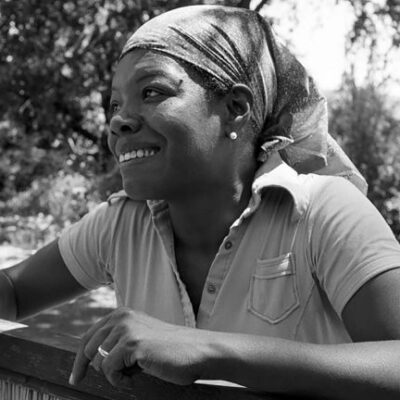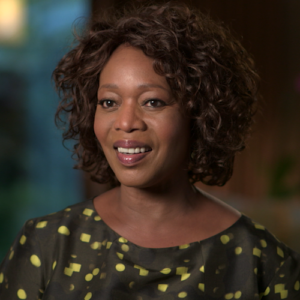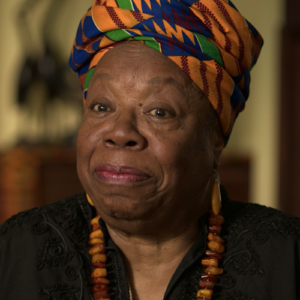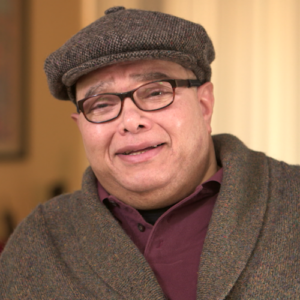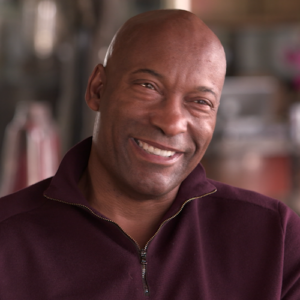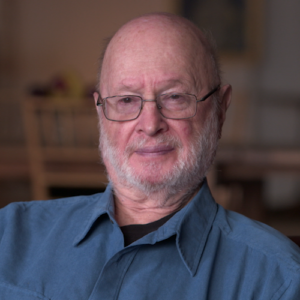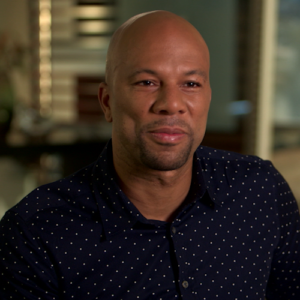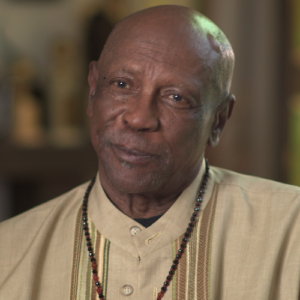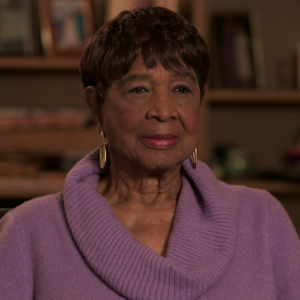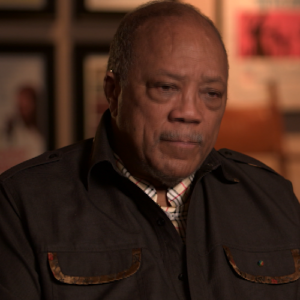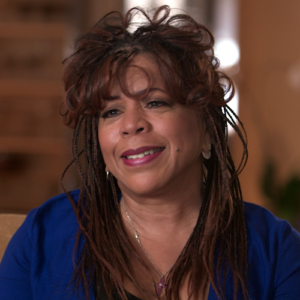Interviewer: I’d like to set up the scene a little bit. If you can describe the sixties in New York, give me a little flavor of the literary scene. The art scene. It was a very lively time, kind of an earth shaking time in America. And New York was in some ways the center of a lot of that sort of certainly the literary world. Just so we know what my Angela was coming into when she started to write her first book, what was the scene?
Bob Loomis: Well, as you know, it was called the Golden Age of Publishing. I think it was publishing the way we all think it should be, at least the way I think it should be. There weren’t any auctions for books. We each considered books and got to buy them. If we wanted to buy a book, we could usually buy it. Authors stayed with their publishers most of the time, didn’t move around. The paperback industry was healthy, so we had paperback rights for almost every book we we wanted. Then we could, and there were book reviews all over the country. Every major city Boston, New York, Miami, St Louis, everywhere. Now, you know, there’s only one major weekly book review, The New York Times. So telling people about a book now is entirely different, more difficult added to the fact that probably. I would say they’re four or five times more titles a year than there were then, maybe 120,000 last year, new titles. Does anybody know about most of those? I don’t think so.
Interviewer: Had you prior to meeting Maya Angelou? Had you ever heard of her? Had you known about her at all? Had she ever come into your consciousness or.
Bob Loomis: I first saw Mia in 1961 at the St Mark’s Theater in the village when she played the White Queen in Ginny’s The Blacks. Very impressive. She was having a wonderful acting career. Then, you know, she went to Europe with Porgy and Bess. Not long after I got to know her, I had dinner with her after she had a rehearsal with Geraldine Page. It was a Broadway show about Mrs. Lincoln, and Maya turned to me and she said something I’ve always remembered. She said, You know, sometimes when I’m acting, I see myself acting, but when I write, I’m lost completely in what I’m doing. There’s nothing else but that. In fact, she even hibernates when she writes. She often rents a room somewhere else. Just a desk, A chair. A legal pad, a pen, and maybe some Johnnie Walker. And that’s why she tries to write so that she is not bothered. Nothing impinges on what she’s doing, which shows the kind of writers she is and what it means to her.
Interviewer: So you mean what she’s saying is she gets into a zone more when she’s writing. She’s acting. She’s almost conscious of the creative process. So in some ways, I infer from that that writing is almost her true art or her or it’s like something that’s deeper with her, something. I Would you explain that?
Bob Loomis: Well, Maya can do everything pretty well. Very well in as a matter of fact, she sings. She. She writes songs. She directs. She’s an actress. She teaches. She edits newspapers. She can do everything but writing. I believe. Is the way she can express what she most want people to know and what she most wants to say.
Interviewer: It’s a beautiful thought. Let me take you back to 1968. And apparently you had gotten a phone call from Judy Phifer. So can you take us back to that period? What happened? Do you recall getting the phone call? How did you how did that come about?
Bob Loomis: Well, I had published Judy, a novel of hers. She called me one day and she said at their house the night before, they had a party. And this woman, Maya Angelou, was there. Now, in that group, there are some wonderful talkers. Jules, I think Philip Roth was at that party. But Judy said this woman told the best stories and more than held her own. And she said she’s got a book in her of some kind. Well, I hate to tell you how many times I’ve heard that, but I called Maya. She was in California, I believe. Then I brought up the subject. She was not warm to it. I called several more times. Got nowhere. And then I decided that I would challenge her. So I told her, which is pretty much true, that writing autobiography is art is just about the hardest thing you can do. And she said, I’ll do it. And believe it or not, she started to write. Now, in those days, younger people and somewhat unknown people did not write books today. It’s very common. I think Frank Conroy’s stop time was one of the few like that. In fact, I sent that book to her and we also decided that I know she’d done a lot in her career that she should try and maybe just write about her childhood. So she began, and that was the beginning of I Know Why the Caged Bird Sings, which launched an incredible career in autobiography.
Interviewer: What was it that you said? I mean, you challenged her. Do you remember what it was you said to her to to challenge her to. She tells a story that James Baldwin urged you to challenge her, but maybe that’s maybe that’s not true.
Bob Loomis: I’m not sure where that came from, because I never talked to Jimmy about this at all.
Interviewer: But what do you remember what you said to her?
Bob Loomis: What was it? Well, I think the idea of something. Being difficult. And very rewarding with some. She hadn’t thought about it that way. I don’t think she maybe even understood. What An autobiography. An autobiography. Scuse me. I don’t think she understood what an autobiography by her would amount to or could be. But once she got into it. She blossomed. I found it. Most very good writers have two special characteristics. One, they seem to be. Very sensitive to what’s going on around them, more so than most people. And they have a memory that’s phenomenal. They remember things in the past that you and I even trying to think about them again would not and would not remember. I went to school in North Carolina, near where Maya lived, and a professor of mine said she had had Thomas Wolfe to dinner one night. And after dinner on the porch, Wolf asked several of the guests to list what they heard. And after they had finished, he mentioned three more things and then they heard them. And I’ve often thought if Maya had been there, Thomas Wolfe would not have been anything to say. As far as memory, you can see, and I know why that she was able to go back, way back and remember. In a very meaningful way. Things that happened to her, that made her life made sense out of her life, actually, because that’s what autobiography has to do. Our lives don’t make a lot of sense day by day sometimes. But she was able to find those stories. And they were anything. There are many things I think she never told anybody before. So it turned out to be a landmark book. And little did we know that it would be the first of seven autobiographies, which I think is unique in American literature. And more than that. Those books. Chronicled a culture that most of us don’t know. Don’t understand and certainly don’t appreciate. And I think that is a tremendous. Accomplishment.
Interviewer: What was it that intrigued you or thought you would not even read any of her? The book hadn’t been written, obviously, so you kind of went on a little bit of a leap of faith. What was it that Judy said or what was an intrigued you that you thought there could be?
Bob Loomis: She just thought she said that Maya Angelou told stories about her life that were mesmerizing and they were stories of. People she’d known. They were stories of adventure that she had. They were stories about her career in nightclubs in California, on and on. She said it’s just an amazing. Life and she maybe could write about it and it would be fascinating.
Interviewer: Huh? Interesting. And then she said in the book something that was very interesting. She said that you pulled me so very plainly quote here that you gently prodded her back into her lost years. What did she mean by that?
Bob Loomis: Well, I guess on the surface it’s pretty clear. I mean, we were able to talk on the phone. About what she had written. And I found that if you become. A sounding board. That that brings a response which increases a lot what she could write about, because she hadn’t done this before, and sometimes she could write a scene that was fine. But I, I didn’t quite understand why something happened or who was there in the room, for instance, silly things like that that the writer automatically thinks, you know, because she knows it. So the more we talked. The more she discovered about her life and what had happened and how she felt about it and who was there. And also. It was important for her to give various segments of her life the proper emphasis. You can’t emphasize every year the same. You have to say this is important. This is not I’ll skip that or this will take a lot more time to tell. I can tell this story in a page. All of that takes a lot of thought because in your mind, at first it’s all quite equal. But she very quickly understood what was needed, what was what she needed to call it, what she needed to keep, and the story she wanted to tell and how it was going to end, at least temporarily.
Interviewer: Once she was starting to write, I Know Why the Caged Bird Sings. Was she sending you pages or how did that work? I mean, what did you what did you think when you first saw the first drafts? What was your pet? I mean, did you think, wow, this is amazing, or did you think it needed a lot of work? Or what was your opinion?
Bob Loomis: It needed some work, but it was only because. In a true sense. He was an amateur. Amateur, you know. I mean, someone who loves something, It doesn’t mean you’re not good. But she had not written anything like this. She had written some poems and songs. This call for a sort of sustained narrative and a connected narrative and characters who were introduced at the right time and so forth. All of that. Was new to her as it would be to any author starting out like that. So that’s all we had to do. That was just the nuts and bolts of how it works. And I was there to see that they were in the right place if I knew. But she was very quick to understand what to do. But it did take. Her. And would any writer. A while to understand this new art form.
Interviewer: So what? When you started to read these drafts of Caged Bird, what what struck you the most? What impressed you the most?
Bob Loomis: And I began to read this manuscript as it came in. I began to understand something that I hadn’t before, that she. Had had horrendous experiences. But that she never became bitter. She never really ranted and raved. Now I edited Willard Motley’s Knock on any door. For instance, in another publisher, I published Hakim Jamal from the dead level. It wasn’t like that at all. She had. People who supported her, who were racist. But in general, she did not pillory them. But rather found. In her life. Something positive, something to give us about what that experience meant and how one could deal with it. So that it didn’t destroy you. That’s what I began to see. And I think that continued through all of those books. And I think it’s unique.
Interviewer: Do you think we’re on that same kind of subject? Was this a painful process for her to write this book or not? I mean, what was your thought about that?
Bob Loomis: I think she was. Sometimes upset by things she remembered in her life. But she dealt with that really superbly. It may sound humorous to say she was more upset about trying to get the book right. This was a new experience for her entity. Having it edited was a new experience for her. Nobody likes to see a lot of checkmarks along the side or something questioned or repetitions noted or anything like that, because after all, when you first write it, it looks perfect, doesn’t it? That was why our relationship lasted. We finally got used to one another and at first we talked a lot about things. We discussed a lot of things. In the more recent books, I could just write on them and I would talk to her. I would write a letter. But she understood a lot more about what she wanted to do and whether what I was saying was helpful or not. And she became a professional. As far as the writing was concerned, and she trusted me because I never, never tried to have her do something that I thought was better than she thought. In fact, she would read to read out loud to me a lot. She read all the poems when she wrote the Clinton inaugural, She called me up on the phone. I think she did that to some other people. It wasn’t a bad sounding board to have that done. But she would read manuscript to me. She would sing to me. She would sing to me in restaurants. And she has a loud voice. I thought it was wonderful, but some head waiters were biting their nails.
Interviewer: That’s great. Oh, when? When I know why the Caged Bird was finally published and it came out to. To great acclaim and adventure eventually became almost a staple in so many people’s libraries. And, you know, it just became a huge hit. Did you expect that? I mean, did you have any idea that it was going to have this kind of impact?
Bob Loomis: I didn’t. I didn’t think.
Interviewer: It.
Bob Loomis: Okay. Yeah, you’re right. Yeah. I got to answer this from context. Well, when we first published Caged Bird, I knew it was a marvelous book and no problem presenting it to the sales force in the house. People loved it. It did get some good reviews, and we had Jimmy Baldwin, a great quote from him. But it was a new genre. He was a new writer. Sales at first were not what I thought they should be. It took time for her. Reputation for the knowledge that she had written this wonderful book to get around. She was a great promoter. You know, when. If you’ve ever heard her speak, it’s a show. She sings, she dances. She recites her poetry and people are on their feet. Those appearances, which were before very large crowds, helped immeasurably call attention to this book. It would have it would have grown, but it grow, grew faster because of that. And and she became more and more. A personality. A person to conjure with in our society. She wasn’t that really at first when we first signed this up, nobody knew about her, really. So it was simply a matter of education. This is a big country. It takes a while for books like this to become understood, to be discovered, let’s put it that way. And it grows. And it’s grown ever since. Amazingly, all of those volumes, while seven are still in print. That’s amazing after all these years. They still sell, they’re still wanted. They’re still touchstones for a lot of people. I’ve been in like a dentist’s office and I see a couple over there and mothers saying, Come here, Maya. And I would go over and say, Why did you name her that? And she said, Have you heard of Maya Angelou? So she’s had children named for her. She has schools named for her. She’s made a mark in this society. And these books continue, I think, to bolster that reputation.
Interviewer: Did she discuss with you or She must’ve discussed the the title of the book from the Paul Laurence Dunbar poem. How did that come about, or did she do you remember?
Bob Loomis: She asked. That title of the book is interesting. I thought it was wonderful. She just had it. And if you look at all the other titles, they all are quite wonderful. He is a genius at titles. They fit the book. They are poetic. Most people can’t do that. Believe me. Lots of trouble. Lots of trouble. But she titles with Maya moore. Piece of cake. She just always had the right one.
Interviewer: Some people have described these autobiographies as being and you had alluded to it, is because she she is also a poet, that they have a different quality than the traditional autobiography, that they have a sense of poetry and a literary quality and a, you know, kind of what can you. What’s your thought on that? What’s your opinion of her style of writing these? What what, what, what makes her books different in some ways?
Bob Loomis: I think one of the great strengths is their simplicity. In fact, I think one of the great strengths of these books also is their style. She is a poet, but. A lot of poems are not easy to read. She is a writer who cries out to be read. If you read her books out loud, which is what she did. They hold up very well. They are even enhanced by sound. Her poems are as well. You know, Russia has a tradition of oral poetry. We don’t have it here. Really. Our white American poet, when they read their poems, that’s what they do. They read them. Might be anybody. My aunt lives her poems, and when she says them, they’re thrilling to hear. And her books partake of that a bit, I think unlike other books which are. Just literary prose. She has sound always in her mind. She’s a singer. She’s a writer. She’s a poet. And yet the books are not precious. They do not sound. Contrived or fancy or too ornate. They’re very simple. That’s what’s so hard to do and do it well.
Interviewer: So I want to jump to the second book. Her second book gathered together. And my name is. It’s a bit of a risk, I take it, because it has some very frank scenes in there of, you know, the prostitution thing, the the failed relationships, the stuff happening with her. And it’s a very tough book, very honest, amazingly honest. And she even, I think, acknowledged to us in one of our interviews that, you know, she knew she was risking something. She had generated, you know, tremendous goodwill, I assume, from this first book. And then she writes the second book that is a you know, it’s a tough book. I mean, it’s a it’s a great book. And I think her goal was to show people that no matter how down you are, you can overcome these obstacles. I think that’s. So what was your thought when she started present the second book to you? Were you nervous about it or were you? What was your take on it?
Bob Loomis: My second book was something of a departure. She described things that most people never talk about. Prostitution, rape problems with children. I was a bit concerned because that was not the usual fare for public books. But Maya was able to write about those things with her. Stature and serenity that they never redound in against her. Ever. I think. We never felt critical of her. That’s quite an accomplishment. And. Looking back on it, I’m not surprised. But at the time, remember, we don’t know what we know now, what she was going to do, what the world what was happening in the world, the taste and the sensibility of the world was changing as well. That could not have been written 30 years before. And yet, when you talk about those things, it sounds as though they’re sensational, but they’re not. They don’t come across that way in the book. They come across as an ordeal and something to be challenged and bested.
Interviewer: One of the themes of many of the books is her relationship with her son Guy. In some ways, some of her regrets that she had about leaving him at certain junctures in Porgy and Bess and things like that in a similar way that maybe it’s a different thing. But there’s a parallel, I think, with how her, as you just alluded to, about her mother having sent her away to live with her grandmother. So, yeah, let’s talk a little bit about that period where guy was taken away. What do you remember about that?
Bob Loomis: You know, one of the most. Indelible and strong. Feelings Meyer has is for Guy, her son. I think she felt very badly when she had to leave him at times because of work and other things. And then there was that awful moment when he was kidnaped. In a sense, she didn’t know what had happened to him. He was gone. But, you know, she kept a bedroom in her house for a guy, a child’s room already, the bed, the pillow, everything. And that was kept for when he would come home. And she never knew when. But one day she told me she was in an airport in the Midwest. A woman came up to her and said, You’re my Angelo, aren’t you? I have, yes. She said, I think I know where your son is. This son was in a commune in the West. And Maya got the authorities and they went to the commune and they rescued a guy and brought him home. Amazing story. And they have been very close ever since. Guy has had medical problems, which have been a terrible burden to her. But I think. The strength they have between one another has helped them weather a lot of those things. And he’s now has an absolutely wonderful wife.
Interviewer: One more thing about the second book. When when that book came out, how was it received? Because it was in some ways a different a different book and a difficult book, you know. What was your thought on that?
Bob Loomis: I don’t think I don’t remember anything like that. Anything really different about it. I, I do think that in the long run, we were not getting as many reviews as I wanted. We were selling the books. She was known. She spoke. There were reviews. They were interviews. But I think you just I just think cut it out because I don’t remember anything specific about any reaction, as you say, to what that concern was. I just don’t remember.
Interviewer: Okay. That’s fine. What about what are your thoughts about the third book, Horrible Woman? What strikes you the most about that book or what? What is most significant about it? You alluded to it. You talked a little bit about her poem that she read for the Bill Clinton’s inauguration in 92. Do you remember when she contacted you and said, I don’t know how she told you about this, but do you have a memory of when she first notified you that she had been selected for this incredible honor? I mean, what was that like?
Bob Loomis: Yes. As we talked, she she took her on.
Interviewer: Just.
Bob Loomis: Went. I remember one day she called and said she’d been invited to write the inaugural poem, which was a great honor, a great responsibility and a great burden. She. Worked and worked on it. I talked to her off and on about it. Not that I have any input because I didn’t know what she was writing. But I think a couple of days before the inauguration, she called and she read it to me on the phone, was it was marvelous, just stunning. She was I think she called a number of people. Maybe she called Oprah and read it. And that morning. It was just a thrilling thing, what she did. And right away, we decided to publish it as a book by itself. That was kind of unusual. We’d never published anything that short books weren’t supposed to be sure. They weren’t supposed to be 20, 30 pages. Right. But we did it, and Maya added some very nice commentary to it, and it was a great success. As it should have been.
Interviewer: Were you at the inauguration? No. Okay. But you probably watched it on TV.
Bob Loomis: Oh, yes.
Interviewer: What did you think when you saw it?
Bob Loomis: Thrilling. Thrilling. She did it. She brought it off. It was perfect.
Interviewer: Do you? I don’t know if this is a fair question to ask it. Do you have a favorite? Maya Angelou. I mean, I guess 31 books with her. Is there any one that is your favorite or stands out the most or.
Bob Loomis: I like caged bird and I like me and Mom and mom and me. They complement each other. Really. They’re the same story in a way. Told differently. It’s kind of interesting to read them and in light of one another. It shows my as. Progress as a writer. And. Her thinking that she could do it now. I was very proud of her when she did that book. It was. I remember those those two books better than any of the other books. That’s the best way I can put it, I guess.
Interviewer: Well, they’re kind of like a bookend in some ways. It’s kind of bring things together. What about her poetry? What? What is different about her poetry? What? She edited a number of her books of poetry. Like, Still I Rise is one of one of my favorite poems.
Bob Loomis: You. We’ve done 12 books of her poetry, I think.
Interviewer: And what is different about that? Working with Poet as opposed to working with her as a memoirist?
Bob Loomis: As far as editing, there isn’t any difference. I mean, one can sense once in a while a phrase that is a little awkward. Maybe not often. No, no, I’m not saying that’s true. I’m only saying it’s the same instinct because I don’t have any stronger or anything for that than anything else. It’s just how does it read? But the poems are different than other poems. Because they are. Lyrical and. Readable. That is, they can be read out loud and they should be. I think their full flavor comes through. They’re very dramatic. They’re very. Sometimes funny, charming, said all those things, but they don’t rely on intricate, intricate intellectual phrases and ideas. They are very direct. Just like her books. Well, in there, there is a there are traditions elsewhere in particularly in Russia. I remember where poems. Are not just read in a chair, but they’re declaimed. A lot of the even more recent Russian poets did that, and they did it very successfully. And I mean, even heard during the war that Russian soldiers would declaim poetry during the war. I think my is in somewhat of that tradition and it makes. Her poetry reached a much larger audience, and she certainly can. Declaim or act it or whatever she does in an astounding way. If you heard or read one of her poems, it becomes alive.
Interviewer: When I think back to the poem mentioned, still I Rise. I think of that poem in some ways as symbolic of a lot of the things in her books as well, that one of the this is my interpretation that a lot of the books have to do with overcoming a obstacle or a struggle. That seems to be an ongoing theme of her life, and it must be in some ways a source of inspiration to all the millions of people that have read these poems in books. I wonder if you if you’ve thought about that. It is it makes sense to you.
Bob Loomis: I think and still I Rise, for instance, is it is a kind of theme poem for her. It does express. Very directly what her books are telling us. That you. You experience these dramatic and sometimes very difficult moments, but you not only survive, but you triumph in some way. You can. And that’s what that poem says. And I think it’s what makes her a different writer than most writers. And it isn’t Pollyannish. It was it isn’t realistic. It isn’t one I covered or not looking in anything, really. She sees things very clearly, but she has seen the humanity. In almost everything. And I think that’s a salvation to our work.
Interviewer: Beautiful. I just have one more thing. You know, she has more than almost anybody I’ve ever heard of, has led the life of about 12 people. Just it’s remarkable the different people she was affiliated with in the movement she was intertwined with and Martin Luther King and Malcolm X and writing it off with all these books and theater and the music. And it just I wonder if there’s something about her that was open. I thought, I’ve been trying to figure this out about her and doing this film. What makes that possible? Was there an openness in her spirit or something that most of us, you know, have only done a few things in her life or one thing in her life, but she’s done 12 things. She’s led the life of 12 or 15 people. What is it about her that has allowed this to happen? It’s not just accident. It can’t be.
Bob Loomis: My life has been so varied, so full of. Dance, poetry, singing theater books. That is very unusual. But what’s really unusual is that she can do it. I think a lot of people may have tried certain things in their lives, maybe tried to dance. Maybe tried to sing. Maybe tried to write a book. But you can’t do all of those things. Most people find out she was able to. I think her very career is because she is multi-talented and she has a very strong will. I wouldn’t say it’s ambition, but it is a drive to excel and to express herself. And she is able to do that, you know, right across the board in the media and do it well. So. The question of whether. She’s unusual for doing all those things. Wanting to. I think it’s unusual that she can do them. That’s if you’re successful and she has been in most of these fields, why not do it? And you find the time also to do it. It does take time. That’s the other thing, fitting all those things into your life. With all she has to do. Is what I find remarkable, really remarkable. And we don’t even know all the things she does. You know, whether it’s planning or sculpture, garden or what. So she’s she has a multiplicity of talent, which is. Really unusual. And she’s been able to express that talent. So successfully that people. Of all kinds react to it. And. That’s a that’s a blessing.
Interviewer: I was at the Wake Forest Library with Rita, and they had boxes of her, you know, archives. Mm hmm.
Bob Loomis: Mm hmm.
Interviewer: And I saw boxes of yellow legal pads. Boxes of them. And I had this image in my head all of a sudden of just. Yeah, reams and reams of yellow legal pads. And I thought it just, you know, of course, she’s been incredibly busy. But then when you see that the evidence of it, you just go. This was a woman who has been incredibly busy and focused writing all this stuff. Yeah. Plays, documentaries, books, poems, essays, acting.
Bob Loomis: Teaching. Right. All of it. That’s what’s that’s what’s amazing. She started out, of course. What a dancer, right? And on her own. You know, she was very young. And she was good enough that she made a living in those nightclubs in California. And she blossomed from there. Game in New York. The books as she in the writing are what will last. These other activities are ephemeral in the sense that they can’t be reproduced later. They fade away unless somebody saw them and remembers them. But the books are there and they will be there a long time. And they are permanent. And it will be enjoyed for a long time. And they are, I think, at the heart of what she is.
Interviewer: You must be very. One last thing. You must be very proud to have had this collaboration yourself. How does it make you feel?
Bob Loomis: Well, I just feel fortunate. I mean, I. This was a whole world. I entered a person who was quite remarkable, and I was I could take partake in it sometimes. You see, we gave her a birthday party once in our apartment, and. Wow, who came was amazing. I never I used to say to myself, this is off the record. Where have all these people been? I mean, I felt that was a stupid remark, but, you know, they weren’t in the society that I was in very few. And they were terrific. They were talented, They were just great people. And that was, to me, a great boon. It was a it was a gift. And that’s what I’ve gotten out of this. I mean, aside from her friendship and and professionally, of course, I was very proud to be able to be her kind of point man in in the publishing business. That’s very important. And that was very satisfying. Still is. Can you imagine after all these years still going on? I’m even retired and I’m talking about it.
Interviewer: I made a couple of notes and I’d like to go back for a minute to when you first saw Maya Angelou in the play, The Blacks. What I’m thinking. This was 61.
Bob Loomis: I believe it was.
Interviewer: And after the years The Caged Bird covers, there was a point in her life where she didn’t see. White people as people she could really have a relationship with. And then in San Francisco, when she met Tosh, and before that time, she actually felt that she could have those friendships at the same time in the country. The fifties were ending. Schools were being integrated during that time in New York. What were race relationships like? Was there mingling? Was there? What was it like at that time?
Bob Loomis: I don’t think there was. In New York in the sixties. And when I saw her in that play. There are a lot of great people in that play, I think Roscoe Lee, everybody. And it was stunning. I remember walking out of that play and being ashamed of being white. I was so taken by its polemic, you know? But. It was still very segregated, even in apartment buildings. There were problems with doormen and all kinds of things. It just it was it was just endemic, but it didn’t impinge much on my life, so I can’t comment much about it. I, I, I remember we tried to hire more black editors, for instance, that was considered the right thing to do. And it was. And we needed to have some entry to to that culture in books, which we didn’t have. But those were just efforts which were, I think all things considered, were minor. There was I think segregation reigned then, just as as as the Jewish thing was also bad. BENNACER couldn’t get in an apartment building. When he got married. He had to buy one. We forget about this going on, you know? So. But New York was a polyglot city. There is lots of there are many immigrants. Italians were the most popular ethnic group, actually, and their restaurants and so forth. So. Frankly, and I was from Ohio. There were no black people in my town. My little city in Ohio. And I grew up. I was relatively innocent in the sense of firsthand experience and so forth. But my family was very liberal. And. But in New York, I, I only. I would get mad at things I remember in our apartment building. And black woman whose child was in a school with somebody’s child in our building. She came to the front door. To pick up her child and the doorman insisted she go to the basement door because she thought she was a servant. Now, if that’s going on, you don’t have a very liberal society in general, you know. But there are always people who. They just never change, you know? It’s just awful in the South, I think still, it’s just a mess. A mess, you know. And she lives in North Carolina, but we went to South Carolina. And I must tell you, the prices, the dollar bills, when I came back, everybody crossed out Lincoln’s face. Last year. So, uh, but she, she, she and she in restaurants, We. I had a problem once. It was a restaurant near Random House. We we had a lovely lunch, and as I left. The head waiters from Miami said, Don’t ever bring her in here again. And I said, Don’t worry, guys, I’m not coming in here either. Now think about it. That’s probably was. Middle sixties, right? So it was there. Much better. But. Her books, of course, probably encountered. Some of that prejudice just because they were by a blind person. Right. I don’t know of any examples of that, but I just can’t help thinking maybe. So, no, I I’m not sanguine about that. It’s it wasn’t good.
Interviewer: But I Know Why The Caged Bird Sings was banned in many places. Do you have an idea of what the no was?
Bob Loomis: Well, it seems obvious. On the other hand, you ought to look at the list of books banned that she was on. Lots of books, not just books by black people. Amazing. We would publish regular novels of the Banned in Boston right away. Right. So there was a whole. I guess, kind of people who felt they were the moral keepers of our flame and they said certain books are not proper and certain ones are okay. And and they were fought pretty hard. I mean, I don’t think that lasted very long, but it was pretty bad for a while. So she was caught up in that for seems to me obvious reasons. We would look at that and it didn’t seem very it was terrible, but it didn’t seem very important. It didn’t seem to have any effect really on much, you know. But but to have it publicly flaunted and listed was an insult, really.
Interviewer: I could never figure out if I know why the Caged Bird Sings was banned because of race or because of the rape in it. If that was what the public was opposed to.
Bob Loomis: I can answer that. I think it was race, but I don’t know. Maybe it was because I remember a lot of this had to do with these books going into high school, junior high school libraries. The main push to this censorship was schools and and in schools. These groups had a lot of power. All they had to do was go to a PTA meeting, see this book, and they would not order it. They would take it off the shelf. Right. Because tampering with children’s morals and whatever was very hard to combat when people were against it, when some parents were against it. A lot of it was there. And I can imagine that. But here we are now. This is mandatory practically, isn’t it?
Interviewer: Of course. Adoptions.
Bob Loomis: Yeah. Yeah. Yeah. Great. Great.
Interviewer: This is a hard question to ask you because you’ve already told us about the books you love. But my Angelo is now known for so many quotes. People quote her all over. She’s got 5 million Facebook fans. And if she. Yes. Hold on. Courage or something? Mm hmm. Everybody then, you know, really feels an affinity to that. You’ve seen I don’t know how many quotes. Anything stick out for you.
Bob Loomis: I mean, from her. No. Well, in her talk, she has these phrases that we are all. We are more alike than not alike. That’s one of hers that I’ve always thought was right. And it’s a it’s She says that every time in every speech I’ve ever heard. And that’s for that’s a good theme. It’s a wonderful idea, but. See, I don’t. Look, I’m sorry to say I don’t see any Facebooks or anything like that, so I am not seeing these quotes you’re talking about, at least not many of them. But I can see how she would be picked up and and not used, but celebrated perhaps for things. She’s very quotable.
Interviewer: I really like what you say about the the race relations at the time, because I think when we paint a picture of New York now, it’s so liberal and even though there are issues and problems, we don’t look at it back that way.
Bob Loomis: At least the liberalism is in the open. You know what I mean? Everybody stand. Everybody honors it in a way, even though it’s not working that well. You know what I mean? We talk about it. You know, the Blasio, for instance, to get in on his platform is amazing. That’s that’s remarkable. I think you’ll have a hard time, but, you know. Well, anyway, it’s it’s it’s. It’s better, you know? It’s better. I see it better.

